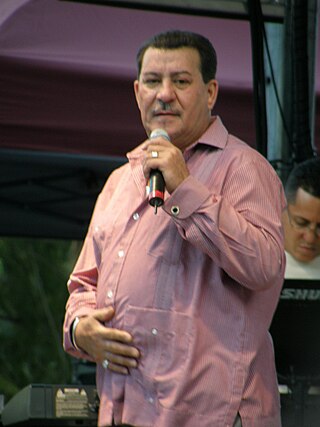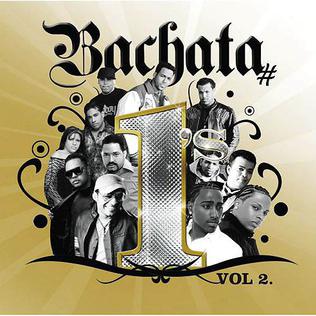
Luis Miguel Gallego Basteri is a Puerto Rican born Mexican singer and record producer. Born in Puerto Rico to an Italian mother and a Spanish father, he is often referred to as El Sol de Mexico, derived from the nickname his mother gave him as a child: "Mi sol". Luis Miguel has sung in multiple genres and styles, including pop songs, ballads, boleros, tangos, jazz, big band, and mariachi. Luis Miguel is also recognized as the only Latin singer of his generation to not cross over to the Anglo market during the "Latin Explosion" in the 1990s.

Raulín Marte Rodríguez is a Dominican bachata artist. He is one of the first major bachata artists to have international success and popularize this style of music in the Dominican Republic. He was one of main pioneers of bachata that help grow the genre's popularity in the 1990s. While traditional bachata songs were often risque and suggestive, Raulín Rodríguez's idealized romantic lyrics helped the style achieve general social acceptability and to receive radio play. Rodriguez is known as El Cacique and is one of the most established musicians to ever come from Dominican Republic. He has many international hits, including the songs: "Nereyda", "Medicina de Amor", "Soledad", Esta Noche, and many more. Among his greatest hits, three of his them have been certified Platinum in the United States by the Recording Industry Association of America (RIAA).

Domingo Antonio Santos Muñoz, known professionally as Antony Santos, is a Dominican musician and singer. One of the top-selling bachata artists of all time, he is known as one of the pioneers of modern bachata in the early 1990s, with his role in redefining the genre to include romantic lyrics, poppy guitar licks, and implementation of new instruments, such as the piano and saxophone. He became the first rural bachatero to reach a mainstream audience with his hit single, "Voy Pa'lla". He has had success with other hits like "Por Mi Timidez", "No Te Puedo Olvidar", "Me Quiero Morir", "Lloro", "Solo Te Amo", "Se Acabó El Abuso" among others. Today, Santos is unanimously considered the greatest bachata artist of all time. He is known as "El Mayimbe" of Bachata, and is the second Dominican musician to acquire this moniker, after Fernando Villalona. He is also known as El Bachatú, the nickname he originally started with.

Julio César "Tito" Rojas López, also known as "El Gallo Salsero", was a Puerto Rican salsa singer and songwriter.

Now Esto Es Musica! Latino is a music compilation album that was released on March 21, 2006 as part of the U.S. Now That's What I Call Music! series. This is first of the series to focus on Latin music, especially Latin pop and Reggaeton.

Frank Reyes is a Dominican singer. Known as the Prince of Bachata, he is regarded as one of the best known bachata artists of all time and famous throughout Latin America. He is a 7 time Bachata of the Year winner at the Soberano Awards, making him the most awarded artist in that category. He is known for hits like "Vine a Decirte Adios", "Con el Amor No Se Juega", "Tu Eres Ajena", "Nada De Nada", "Quién Eres Tu", "Princesa", "Amor a Distancia", "Decidí", among others.

Now Esto Es Musica! Latino 3 was released on October 2, 2007. Unlike the previous two NOW Latino albums, this volume features eighteen tracks rather than twenty and adds songs from the salsa and bachata musical genres.

Reik is the debut eponymous album from Mexican Latin pop group Reik, released on May 24, 2005 through Sony BMG. The album features these singles: "Yo Quisiera", "Qué Vida La Mía", "Noviembre Sin Ti", "Niña" and "Levemente".

Mexican pop-rock band Maná has released 9 studio albums, 3 live albums, 7 compilation albums, 5 video albums, 2 box sets and 1 soundtrack album. Throughout their career, Mana has sold over 40 million albums worldwide, becoming the most successful Latin American band of all time. ¿Dónde Jugarán Los Niños? remains as the best-selling Spanish-language rock album in history with 10 million copies sold worldwide.
The 2008 Billboard Latin Music Awards, produced and broadcast live on Telemundo, was held on Thursday, April 10, 2008. The award show aired on Telemundo at 7pm EST.
The Billboard Latin Music Awards grew out of the Billboard Music Awards program from Billboard Magazine, an industry publication charting the sales and radio airplay success of musical recordings. Originally launched as the Billboard Latin Music Conference in 1990, the first awards began in 1994. In addition to awards given on the basis of success on the Billboard charts, the ceremony includes the Spirit of Hope award for humanitarian achievements and the Lifetime Achievement award, as well as awards by the broadcasting partner.
The 2009 Billboard Latin Music Awards was held on Thursday, April 23, 2009 at the BankUnited Center at the University of Miami in Coral Gables, Florida. It is produced and broadcast lived on Telemundo network. The nominees were announced on Tuesday, February 17, 2009 during a live televised morning show Levantate on Telemundo network.
Top 100 México was a record chart which accounted for sixty percent of the albums sold in Mexico. The chart had the support of major record distributors in Mexico and was issued by the Asociación Mexicana de Productores de Fonogramas y Videogramas on a weekly basis from 2005 until July 9, 2020, when the chart was discontinued. The Top 100 México contained over 100 titles sold in the country, with separate charts that include 20 albums for popular music genres, such as norteño, banda and ranchera, Spanish, and English language albums.

Bachata #1's, Vol. 2 is a compilation album released by Machete Music. The recording features tracks performed by several artist from the bachata genre, such as Aventura, Xtreme, Toby Love, Óptimo, Monchy & Alexandra, Leny, Domenic Marte, Zacarías Ferreíra, Frank Reyes, Carlos & Alejandra, Joe Veras, Yoskar "El Prabu Sarante", and Alex Bueno. It also features a bachata performed by Latin pop singer Luis Fonsi exclusive to this release.

Roberto Tapia is an American singer of Mexican ancestry. He was born in San Diego, California and raised in Culiacán, Sinaloa, Mexico. He adopted the Regional Mexican genre and in August 2012, his album El Muchacho hit #1 on Billboard's Top Latin Albums chart. Tapia was one of three coaches on the first two seasons of La Voz Kids, a Spanish-language version of The Voice featuring American Spanish-speaking children on the Telemundo Network. He inclusively became a business man in the year of 2013, promoting restaurants, and still continuing with his singer life.

Greeicy Yeliana Rendón Ceballos, known mononymously as Greeicy, is a Colombian actress and singer.

Felix Gerardo Ortiz Torres and Gabriel Pizarro, known by their stage name Zion & Lennox, are Puerto Rican reggaeton singers, rappers and songwriters. Both artists were born in Carolina, Puerto Rico, were the duo was originated in 2000. They were part of the reggaeton underground scene until 2004, year in which they released their first studio album, Motivando a la Yal, under White Lion Records. The production's success was later influenced by Daddy Yankee's Barrio Fino, which led reggaeton to mainstream audiences. Also the track "Ahora" featuring Angel Doze was included into the video game FIFA Football 2005 soundtrack.

Miguel Ignacio Mendoza Donatti, better known as Nacho, is a Venezuelan singer and rapper. Born in Lechería, Anzoátegui, Venezuela. Currently lives in Miami, Florida, United States. He is a member of the duo Chino & Nacho.
Jesús Manuel Nieves Cortés, known professionally as Jhayco, is a Puerto Rican rapper and singer from Río Piedras, San Juan. After releasing multiple EPs, his debut studio album, Famouz, was released in 2019.
This article includes an overview of the major events and trends in Latin music in the 1980s, namely in Ibero-America. This includes recordings, festivals, award ceremonies, births and deaths of Latin music artists, and the advancement and adjournment of the genre from 1980 to 1989.














